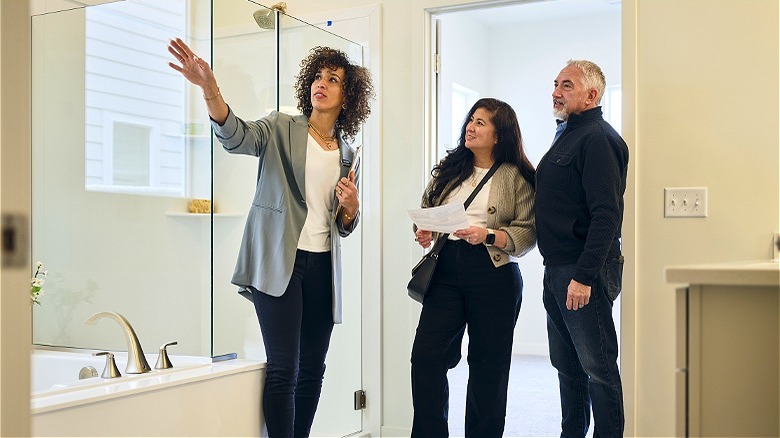What You Should Never Say When Buying A House
Buying a house is easier said than done. According to Redfin, the average cost of a home in the United States is at an all-time high: $434,000 as of May 2024. Meanwhile, many individuals and families who purchased a starter home several years ago are forced to stay put because an upgrade is outside of their budget, while those seeking their first home have few options due to skyrocketing prices and low availability. Therefore, when one does find themselves in the coveted position of being able to tour and make an offer on a home (while keeping in mind these popular myths about buying a home), it's a simultaneously thrilling and nerve-racking experience and you could find yourself saying things you shouldn't.
In such a situation, it can be easy for an interested buyer to gush to the seller about how it's their dream home, how they've already been pre-approved for a large sum, and other key details that, in the buyer's mind, are showcasing how they're the perfect candidate. However, statements such as these could hinder, rather than help, someone's chances at securing a house.
Don't gush about or insult the home
Real estate experts agree that potential buyers should keep their thoughts about the home, whether positive or negative, to themselves. If the space is an absolute dream and exactly what they've been seeking, it might seem like a no-brainer to inform the seller and/or listing agent. However, experts warn that, while a few compliments are welcome, those who gush too much about a home can be taken advantage of and ruin their chances at negotiating. According to Las Vegas-based real estate agent Andrew Finney of King Realty Group, "The seller may feel or get in their mind that they'd be able to ask you for a higher price and drive the price even higher than their current listing price because you've mentioned that it's your dream house."
On the other hand, potential buyers also shouldn't vocalize their dislike of the décor, furniture, or other aspects of the home, and how much they plan to renovate, until they're in private. Plus, even if such things aren't to someone's liking, they can simply change it once they close. Most sellers aren't naive to the fact that new owners will put their own touches, but hearing insults about a space filled with memories and milestones probably won't sit right.
Keep your financial information private
Speaking openly about how much one can (or can't) afford is another faux pas that can hinder a potential buyer's chances of closing on a house they're hoping to buy. While it might seem helpful to announce how much you're pre-approved for, especially if that number is at or above the seller's asking price, you've likely tossed any chances of negotiation out the window. (Check out the 11 things first-time buyers always get wrong about buying a home.)
Said Andrew Finney, "That's like going into a poker game and saying, 'Hey, I'm just gonna start betting high on all these hands. I know I'm not gonna win them all, but I'm gonna bet it because I got it. I'm gonna spend it anyway, so I'm just gonna go ahead and throw it all in.' You wouldn't wanna do that, would you? That would be tipping your hand." Similarly, you don't want to say anything that leaves you in a weaker position when it comes to the homebuying process.
Just as one shouldn't reveal details about a positive financial situation, they also shouldn't openly speak about a less-than-ideal one. You'll want to avoid purposely bringing attention to things like late credit card payments or recent large purchases made. While everything eventually will come to light when getting approved for a mortgage, there's simply no reason to bring anything up to the seller or listing agent when viewing the home, as it can ruin any chance of being considered. (On that note, here's how to buy a house if you're broke.)


